

Heraclitus. Immanuel Kant 1724-1804. Mary Wollstonecraft. Mary Wollstonecraft (/ˈwʊlstən.krɑːft/; 27 April 1759 – 10 September 1797) was an eighteenth-century English writer, philosopher, and advocate of women's rights.
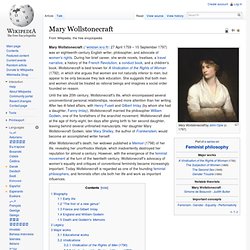
During her brief career, she wrote novels, treatises, a travel narrative, a history of the French Revolution, a conduct book, and a children's book. Wollstonecraft is best known for A Vindication of the Rights of Woman (1792), in which she argues that women are not naturally inferior to men, but appear to be only because they lack education. She suggests that both men and women should be treated as rational beings and imagines a social order founded on reason. Until the late 20th century, Wollstonecraft's life, which encompassed several unconventional personal relationships, received more attention than her writing. Mary Shelley. Mary Shelley (née Mary Wollstonecraft Godwin; 30 August 1797 – 1 February 1851) was an English novelist, short story writer, dramatist, essayist, biographer, and travel writer, best known for her Gothic novel Frankenstein: or, The Modern Prometheus (1818).
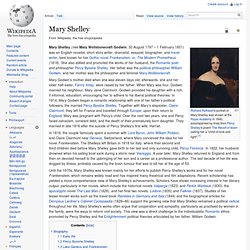
She also edited and promoted the works of her husband, the Romantic poet and philosopher Percy Bysshe Shelley. Her father was the political philosopher William Godwin, and her mother was the philosopher and feminist Mary Wollstonecraft. Mary Godwin's mother died when she was eleven days old; afterwards, she and her older half-sister, Fanny Imlay, were raised by her father. Epicurus. Ancient Greek philosopher For Epicurus, the purpose of philosophy was to help people attain a happy, tranquil life characterized by ataraxia (peace and freedom from fear) and aponia (the absence of pain).
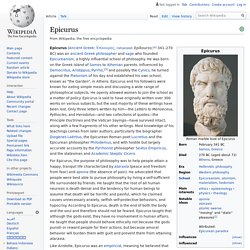
He advocated that people were best able to pursue philosophy by living a self-sufficient life surrounded by friends. He taught that the root of all human neurosis is death denial and the tendency for human beings to assume that death will be horrific and painful, which he claimed causes unnecessary anxiety, selfish self-protective behaviors, and hypocrisy. According to Epicurus, death is the end of both the body and the soul and therefore should not be feared.
Epicurus taught that although the gods exist, they have no involvement in human affairs. Socrates. Socrates (/ˈsɒkrətiːz/;[2] Greek: Σωκράτης [sɔːkrátɛːs], Sōkrátēs; 470/469 – 399 BC)[1] was a classical Greek (Athenian) philosopher credited as one of the founders of Western philosophy.
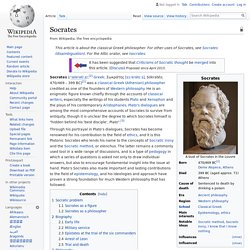
He is an enigmatic figure known chiefly through the accounts of classical writers, especially the writings of his students Plato and Xenophon and the plays of his contemporary Aristophanes. Plato's dialogues are among the most comprehensive accounts of Socrates to survive from antiquity, though it is unclear the degree to which Socrates himself is "hidden behind his 'best disciple', Plato".[3] Through his portrayal in Plato's dialogues, Socrates has become renowned for his contribution to the field of ethics, and it is this Platonic Socrates who lends his name to the concepts of Socratic irony and the Socratic method, or elenchus.
Socratic problem. Carl Jung. Carl Gustav Jung (/jʊŋ/; German: [ˈkarl ˈɡʊstaf jʊŋ]; 26 July 1875 – 6 June 1961), often referred to as C.

G. Jung, was a Swiss psychiatrist and psychotherapist who founded analytical psychology.[2] Jung proposed and developed the concepts of the collective unconscious, archetypes, and extraversion and introversion. His work has been influential not only in psychiatry but also in philosophy, anthropology, archeology, literature, and religious studies. He was a prolific writer, though many of his works were not published until after his death. The central concept of analytical psychology is individuation—the psychological process of integrating the opposites, including the conscious with the unconscious, while still maintaining their relative autonomy.[3] Jung considered individuation to be the central process of human development.[4] Early years[edit] Childhood family[edit] Jung's mother left Laufen for several months of hospitalization near Basel for an unknown physical ailment. Greatest Philosophers Summary.
Philosopher Bios. Dead Philosophers in Heaven.
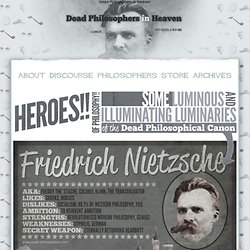
Nietzsche. Philosophy as the Great Naïveté. Jason Stanley interviewed by Richard Marshall.

Jason Stanley is a multi-groove philosopher at Rutgers. He translated some Frege with Richard Heck. He wrote a cool book Knowledge and Practical Interests and last year a brain-boning book Know How that lames the virtue epistemology and ethics tradition started way back with the Ancient Greeks. He thinks philosophy is perpetual crisis. For many he is to philosophy what Ocarina of Time is to video games. 3:AM: You have strong views about philosophy in general, in particular the public perception of its place in the academic curriculum. The Splintered Skeptic. Eric Schwitzgebel interviewed by Richard Marshall.
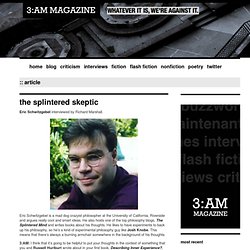
Eric Schwitzgebel is a mad dog crazyist philosopher at the University of California, Riverside and argues really cool and smart ideas. He also hosts one of the top philosophy blogs, The Splintered Mind and writes books about his thoughts. He likes to have experiments to back up his philosophy, so he’s a kind of experimental philosophy guy like Josh Knobe. This means that there’s always a burning armchair somewhere in the background of his thoughts. George Steiner, a certain idea of knowledge. Literature, philosophy, science: today, our tools for understanding the world are developing separately, regrets the renowned intellectual and humanist.

However, culture remains a saving grace, particularly in Europe. Excerpts. Nietzsche, Heraclitus and Dante are the heroes of his new book, The Poetry of Thought, but for the moment they can wait. George Steiner welcomes us into his house in Cambridge with a whimsical anecdote delivered over coffee and panettone: when the Eurostar was launched, he offered a shilling to the first child to see a fish in the Channel Tunnel. What Anscombe Intended & Other Puzzles. Kieran Setiya interviewed by Richard Marshall.

Kieran Setiya is a chillin’ philosopher in Pittsburgh. He’s thinking hard about knowing right from wrong and has written a book about this coming out soon. He wrote a book called and wonders whether moral theory corrupts youth. He wrote about knowledge of our intentions in the recent seminal book . Bertrand Russell (1872-1970) Brief Lives Alistair MacFarlane reveals paradoxes in the long life of the third Earl Russell. Bertrand Russell, third Earl Russell, was born on 18th May 1872 at Cleddon Hall, Monmouthshire, into one of the great political families of Britain. His grandfather, Lord John Russell, the Whig politician and first Earl, who twice became Prime Minister, steered the 1832 Reform Act through Parliament. John Stuart Mill was Bertrand’s godfather, and young Bertie was introduced to Queen Victoria when he was two years old. Heidegger On Philosophy Itself. It would seem that in order do philosophy at all, one must first know what philosophy is.
Like many other philosophers, Martin Heidegger has a unique answer to the question “What is philosophy?” This paper will examine comments Heidegger has made on the nature and use of philosophy. How Are We Getting Epicurious? The Meanings That Come From a Greek Philosopher By Philologos Published February 27, 2012, issue of March 02, 2012. Last week’s column ended with a question: Why, of all the philosophers of classical antiquity, was it Epicurus whose name, in the form of apikoros, became a rabbinic byword for a religious skeptic or heretic? To this we might add a second question. Of Hume and Bondage. Wittgenstein’s camera. “Don’t think, look!” - Ludwig Wittgenstein The woman with the haunted look staring back out of the photograph has never existed.
Rethinking the formula of humanity. Japa Pallikkathayil interviewed by Richard Marshall. Japa Pallikkathayil is a funky new philosopher in New York University. She discusses the relationship between morality and politics. She knows there are layers to the problems facing women in philosophy. She often disagrees with Kant. Eric Schwitzgebel: Black and, Err, White. Green Guy, Pete Mandik, 2003. Photograph by Rachelle Mandik by Eric Schwitzgebel Many philosophers consider the era of “modern” philosophy to begin with René Descartes’s Discourse on Method (1637) and Meditations on First Philosophy (1641).
In these works, Descartes aims to ground human knowledge of the external, material world – the world of the newly arising modern science – upon a secure, indubitable foundation. Peter Singer and Tyler Cowen transcript. Spinoza and The First Amendment. The Stone is a forum for contemporary philosophers and other thinkers on issues both timely and timeless. Socrates. Xenophon. Diogenes Laërtius. Sophocles. Life[edit] Pythagoras. Pythagoras of Samos (/pɪˈθæɡərəs/; Ancient Greek: Πυθαγόρας ὁ Σάμιος Pythagóras ho Sámios “Pythagoras the Samian”, or simply Πυθαγόρας; Πυθαγόρης in Ionian Greek; c. 570 BC – c. 495 BC)[1][2] was an Ionian Greek philosopher, mathematician, and founder of the religious movement called Pythagoreanism.
Most of the information about Pythagoras was written down centuries after he lived, so very little reliable information is known about him. Archimedes. Seneca the Younger. Hippocrate. Hipocrat din Cos - Bust aflat în "Galleria degli Uffizi", Florenţa Hipocrat, Hipocrate sau Hippocrates din Cos (n. cca. 460 î.Hr. pe insula Cos din Arhipelagul insulelor Sporade, d. cca. 370 î.Hr. în localitatea Larissa din Tessalia) a fost cel mai vestit medic al Greciei antice și este considerat părintele medicinei. Numele lui este legat de Jurământul lui Hipocrat, un adevărat codice moral al unui medic în exercitarea profesiunii sale, jurământ prestat și în zilele noastre în multe universități de către absolvenții facultăților de medicină. Herodot. Herodot şi Tucidide. Euripide. Sofocle. Tucidide.